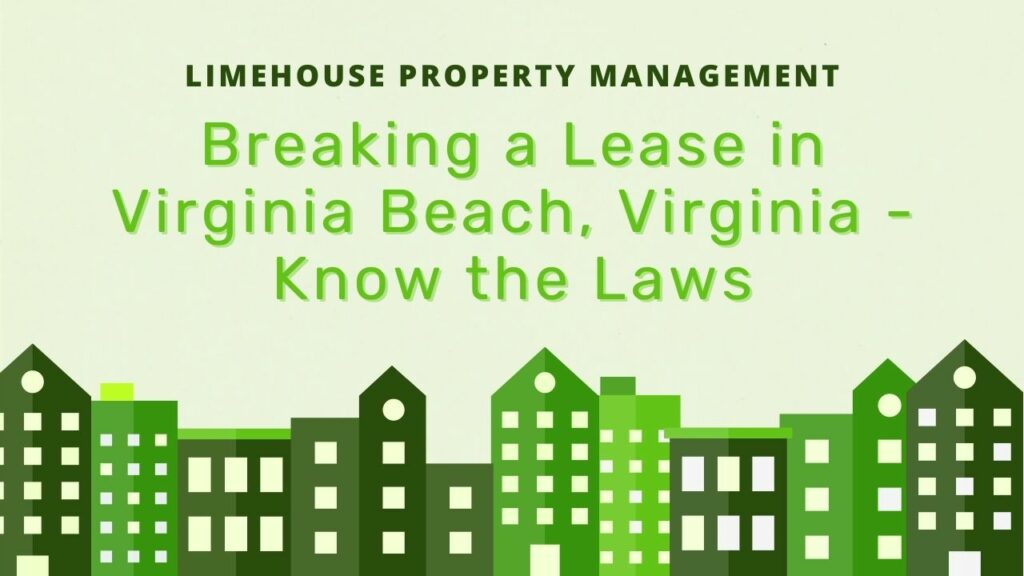Breaking a Lease in Virginia Beach, Virginia – Know the Laws

A lease is a contractual agreement between a landlord and a tenant. It runs for a certain duration of time, during which both parties must abide by its terms. Unfortunately, this doesn’t always happen.
Sometimes, a tenant may want or need to break the lease agreement early.
In Virginia, there are consequences for breaking a contractual agreement. However, there are exceptions that make breaking a lease in Virginia legally justified.
In this post, we are giving you an overview of everything you need to know when breaking a lease in Virginia.
When Breaking a Lease Agreement is Legally Justified in Virginia
Here are 5 legally justified reasons a tenant can break a lease early:
1. There is an early lease termination clause.
Your tenant may be able to terminate their lease early if they meet the requirements of the early termination clause or if an early termination is approved by the Landlord. Usually, a tenant must meet two requirements:
- They would have to provide the landlord with a proper notice, usually 60 days. This gives landlords some time to find a replacement tenant for the unit.
- They would have to pay a fee, usually equal to the rent of 2 months.
2. Your tenant is starting an active military duty.
Is your tenant beginning active military service? If so, the Servicemembers Civil Relief Act offers them protection when either deployed or when they change station.
The protection offered by the act starts on the date the tenant enters active duty and ends 30 to 90 days after being discharged.
Your tenant must meet certain requirements, which include:
- Proving that they signed the lease before starting active military duty.
- Proving that they will remain on active duty for at least the next ninety days.
- Notifying the landlord of their intentions to move out to start an active military career.
- Showing the deployment letter from their commanding officer stating the same.
Once your tenant meets all these requirements, they will no longer have any responsibilities to the lease. However, they cannot move out immediately. They must wait until 30 days after the next rent period begins to vacate the unit.

3. The rental unit is no longer livable.
Your tenant may also be able to break the lease if their unit becomes uninhabitable.
Tenants have a right to live in a habitable rental property. A habitable property is one that meets all the basic safety, health and building codes as per state and local laws.
The following are a few things that make a property habitable:
- Drinkable water
- Heat during the cold weather
- Working electricity
- Reasonable protection from criminal harm
- Functioning smoke and carbon monoxide detectors
If you don’t provide such conditions, your tenant may have a right to exercise one among several legal options available to them. One among these is the right to “Deduct & Repair” (§ 55.1-1244.1.).
If your tenant notifies you of maintenance issues or repairs that are impacting the unit’s habitability and you fail to respond within a reasonable time frame, your tenant would be deemed “constructively evicted.” At this point, your tenant would have no further responsibilities in regard to the lease agreement.
That’s why it’s imperative for you, as a landlord, to respond to maintenance requests within a reasonable period of time.
4. You violate your tenant’s privacy.
Violating your tenant’s right to privacy is a serious violation of the lease agreement.
You must not enter your tenant’s apartment without notifying them beforehand. In Virginia, you must give your tenant a notice of at least 24 hours prior to entering their rental property (Va. Code Ann. §§ 55.1-1229).
The reason for your entry must also be reasonable. For instance, it may be to:
- Show the unit to prospective tenants, buyers or lenders.
- Show the rental unit to a potential buyer of the property.
- Show the unit to a prospective tenant toward the end of tenancy.
- Inspect the property for safety or maintenance problems.
- Make repairs, such as to fix a broken stove.
5. Your tenant is a domestic violence victim.
Domestic violence victims have a special rental provision for their protection. According to Virginia state law, victims of sexual abuse, family abuse, or criminal sexual assault have special rights, including the ability to end their lease early with a 30 days’ notice.

Landlord’s Duty to Find a New Tenant in Virginia
In Virginia, you must take reasonable steps to re-rent the unit after your tenant breaks their lease. (§ 55-248.33, 55-248.35).
If you find a replacement tenant, then the tenant who broke the lease will only have to pay rent for the time that the property was vacant, in addition to any applicable fees for Early Termination penalties.
However, until you find another tenant, the old tenant will be responsible for paying rent for the remaining months under the lease agreement.
Bottom Line
To break a lease without consequences, a tenant must have a legally justified reason.
We hope this post about breaking a lease in Virginia was helpful. If you have further questions about this topic or any real estate or landlord-tenant laws, please contact Limehouse Property Management today.
Disclaimer: This blog is not a substitute for professional legal advice. Laws change and the information herein may no longer be up-to-date. If you require professional legal help, kindly get in touch with a qualified attorney or an experienced property management company.
